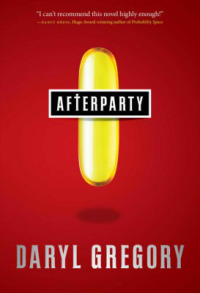Afterparty by Daryl Gregory
 Monday, April 21, 2014 at 9:26AM
Monday, April 21, 2014 at 9:26AM 
Published by Tor Books on April 22, 2014
Afterparty begins with a parable, which seems appropriate for a book that is about the intersection of science and God. Daryl Gregory's characters offer a variety of viewpoints about the nature of religious belief -- some have faith, some don't -- but the novel is intended to entertain, not to persuade the reader to adopt a particular viewpoint. The entertainment level is high -- humor is easy to mine from the subject matter, the plot offers the twists of a low-key thriller with a bit of near-future technology, and the characters are pleasant company -- while the underlying themes permit open minds to interpret the novel's serious side in different ways.
Afterparty's protagonist is Lyda Rose, who begins the novel as a patient in a mental health institution. Lyda's issues include a history of drug abuse, unresolved grief for her dead wife, and an invisible companion. A teenage girl is admitted to the institution who had been living rough on the street until she found God, a discovery that followed her ingestion of a piece of paper that Pastor Rudy called Numinous. Lyda holds herself responsible for Numinous and she holds Numinous responsible for a very bad moment in her life, although her memory of that moment is incomplete.
Numinous was created by Little Sprout, a research company that Lyda and her friends founded to develop a drug that would spur the brain's production of neurotrophins with the goal of correcting the conditions that cause schizophrenia. A side effect of the drug makes the user believe in some version of God. It also makes the user feel God's presence, often accompanied by a visual image -- in Lyda's case, an angel. Overdose, as Lyda did, and the visual image never goes away. Since Lyda is an atheist, a drug that induces a belief in God is supremely annoying to her, as is the sarcastic and quarrelsome angel. Tellingly, a child born to a character who used Numinous while pregnant experiences manifestations that have little to do with religion.
The engaging story requires Lyda to reestablish contact with her partners in Little Sprout. With the help of a paranoid schizophrenic (and former intelligence officer) named Olivia who befriended Lyda in the mental institution, Lyda tries to track down the drug's manufacturer. A mysterious and dangerous man in a cowboy hat named the Vincent also has an interest in Numinous. Of course, the explanation for the reappearance of Numinous is not as simple as it appears to be. Neither is the explanation of the mysterious event from Lyda's past. All the plot threads eventually weave together to create a fun, fast-moving story.
Despite its lighthearted nature, Afterparty considers serious questions. Is free will an illusion? Moral judgment aside, are we responsible for our actions? Do religions demand a belief in illusions? Is it possible for the imaginary to be real? Are illusions useful? Is religion (as Marx suggested) a metaphorical drug? Gregory allows the reader to draw his or her own conclusions to questions that are not easily answered. Among its other lessons, Afterparty makes the point that the mind is capable of conjuring all sorts of realities and that we often lack the ability to decide which are objectively real, or even to understand whether objective reality exists. Perhaps the novel's most important lesson is that it is possible to disagree about profound issues -- even about religion -- without being rude.
RECOMMENDED
Reader Comments